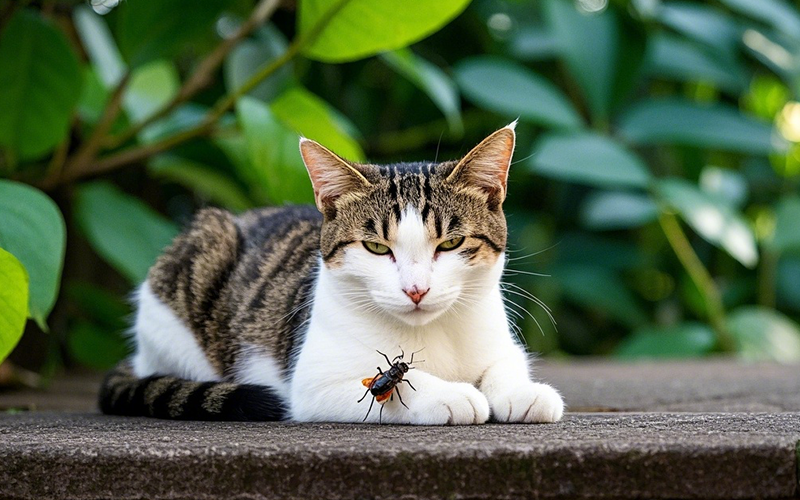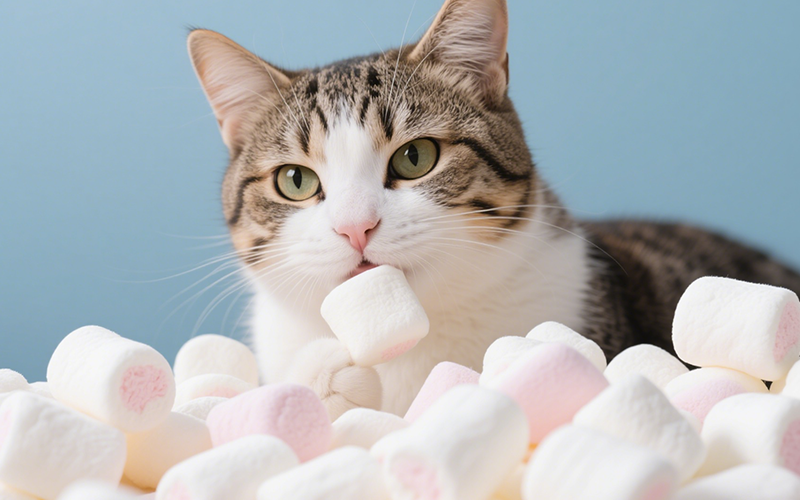Can Cats Eat Stink Bugs? The Risks Explained
- 24 Mar 2025 14:33
If you’ve ever noticed your cat chasing after a stink bug and playing with it, you may have wondered: Can cats eat stink bugs? While it’s certainly a natural behavior for cats to hunt insects, it’s important to understand the potential risks involved when your cat eats a stink bug. Let’s break down why this might not be the best snack for your furry friend. 🐱🐞

Are Stink Bugs Toxic to Cats?
The good news is that stink bugs are not toxic to cats. If your cat eats a stink bug, it likely won’t cause poisoning. However, there are still some important reasons to be cautious about your cat’s insect-snacking habits. 🚫
Why Cats Are Drawn to Stink Bugs
Cats are natural hunters, and they are often attracted to insects like stink bugs due to their movement, size, and texture. Cats love to bat at and chase bugs, making stink bugs an easy and fun target. Plus, their small size makes them appealing as a quick and satisfying snack. 🐾
Potential Risks of Eating Stink Bugs
Although stink bugs are not directly poisonous to cats, eating them can still cause some issues:
Stinky Aftertaste and Irritation: The most obvious concern with stink bugs is their odor. When threatened or crushed, stink bugs release a foul-smelling chemical as a defense mechanism. This can leave an unpleasant aftertaste in your cat’s mouth, and it might also irritate their mouth, gums, or digestive system. 🦠💥
Gastrointestinal Upset: Eating a stink bug may cause your cat to experience vomiting, diarrhea, or digestive discomfort. Although the bug itself isn’t toxic, the chemical compounds released by stink bugs, as well as the rough texture, could irritate your cat's stomach. 🤢
Risk of Choking or Blockage: As with any insect, there’s also the potential for a choking hazard or intestinal blockage if your cat swallows a stink bug whole or consumes multiple bugs at once. Cats that aren’t careful chewers may inadvertently swallow parts of the bug, which can pose a risk to their airway or digestive tract. ⚠️
Insecticides or Chemicals: If stink bugs have been exposed to pesticides or chemicals, those substances can also end up in your cat’s system. Ingestion of these toxins could lead to poisoning or other health problems. Always be cautious if your home or garden uses pest control products. 🧴
What to Do If Your Cat Eats a Stink Bug
If you catch your cat eating a stink bug, here are a few steps you can take:
Observe for Symptoms: Keep an eye on your cat for any signs of vomiting, diarrhea, or lack of appetite. If they seem uncomfortable or ill, it’s important to monitor them closely.
Ensure Hydration: If your cat is experiencing any digestive upset, make sure they have access to fresh water to stay hydrated. Dehydration can worsen symptoms.
Contact a Pet Health Consultant: If your cat’s symptoms don’t improve or if they show signs of choking, difficulty breathing, or lethargy, it’s a good idea to contact a pet health expert or reach out to a service like PettureX. PettureX offers 24-hour online consultations and can provide personalized advice if you’re concerned about your cat’s health. 📱🐾
How to Prevent Your Cat from Eating Stink Bugs
To prevent your cat from munching on stink bugs, you can try a few methods:
Seal Gaps: Stink bugs often enter homes through small gaps or cracks in windows, doors, or walls. Seal these entry points to reduce the chances of stink bugs wandering into your home. 🏠
Use Natural Repellents: Some natural repellents, such as essential oils (peppermint, lavender), may help keep stink bugs at bay. However, be cautious when using oils around cats, as they can be toxic in certain concentrations.
Redirect Your Cat’s Attention: If your cat seems intent on eating insects, consider offering them safe and healthy alternatives, like cat grass or catnip, to satisfy their instinct to chew on plants. 🌾
Monitor Insect Activity: Try to keep your home free from bugs by regularly cleaning and using safe pest control methods. If stink bugs are a frequent problem, consider using traps or eco-friendly pest solutions. 🧹
How PettureX Can Help with Your Cat’s Health
If your cat eats something questionable like a stink bug and you’re unsure about the risks, PettureX is a great tool for getting answers quickly. With 24-hour online consultations and pet image recognition, PettureX can help you determine if your cat is in danger and guide you on the best course of action. 📱
Conclusion
Can cats eat stink bugs? While stink bugs are not toxic to cats, they can still cause some digestive upset and other issues, such as irritation, vomiting, or diarrhea. It’s best to prevent your cat from eating them by taking steps to reduce insect activity in your home. If your cat does consume a stink bug, monitor them closely and consult a pet health service like PettureX if you notice any concerning symptoms.
Has your cat ever eaten a stink bug? How did they react? 😸
Related

Marshmallows and Cats: A Puffy Problem? Why Vets Say No to This Sugary Snack
- 22 Apr 2025
Kefir for Kitties? A Veterinarian-Reviewed Guide to Safety, Benefits & Risks
- 22 Apr 2025
The Burning Question: Can Cats Eat Jalapenos? A Comprehensive Safety Guide
- 21 Apr 2025
Cool Temptation: Can Cats Eat Ice Cream Safely? The Vet-Backed Truth
- 21 Apr 2025
Frankly Dangerous: Can Cats Eat Hot Dogs? Vet Explains the Serious Risks
- 16 Apr 2025
A Purrfect Protein? Can Cats Eat Ground Turkey Safely? (Vet-Reviewed Guide)
- 16 Apr 2025
Gritty Situation: Can Cats Eat Grits Safely? Vet Explains the Risks
- 16 Apr 2025
Crunchy Query: Can Cats Eat Green Peppers? A Vet-Reviewed Safety Analysis
- 16 Apr 2025
Gravy Danger Zone: Can Cats Eat Gravy Safely? (Vet-Reviewed Warning)
- 16 Apr 2025
Toxic Temptation: Can Cats Eat Grapefruit? Vet Explains the Dangers
- 16 Apr 2025
